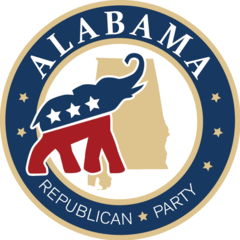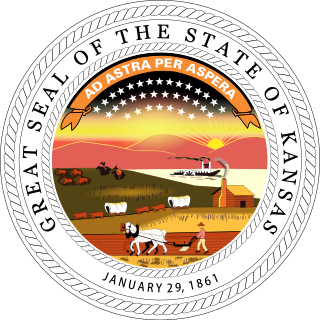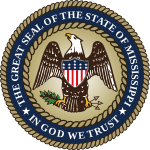Results for Statewide Offices
According to the state constitution, a statewide officer must win both the majority of electoral votes and the majority of the popular vote to be elected.
The number of electoral votes equals the number of Mississippi House of Representatives districts, currently set at 122. A plurality of votes in each House District is required to win the electoral vote for that District. In the event of a tie between the two candidates with the highest votes, the electoral vote is split between them.
In the event an officeholder does not win both the majority electoral and majority popular vote, the House of Representatives shall choose the winner. The Democrats held a large edge (73–46 with three vacancies) in the House, thus ensuring that any contested race will go to the Democratic candidate.
Commissioner of Agriculture and Commerce
Note: Spell was elected as a Democrat in 2003, but changed his party affiliation to Republican.
Commissioner of Insurance

Elections in Georgia are held to fill various state and federal seats. Georgia regular elections are held every even year. The positions being decided each year varies, as the terms of office varies. The State Senate, State House and U.S. House will typically be up for election, as all of those positions have two-year terms. Special elections are held to fill vacated offices. Georgia is one of seven states that require a run-off election if no candidate receives a majority of the vote in a primary election. Uniquely, Georgia requires a run-off election for state and congressional offices if no candidate wins a majority of the vote in a general election; only Louisiana has a similar requirement, but it operates under a different election system.

A general election was held in Mississippi on November 4, 2003 to elect to 4 year terms all members of the state legislature, the offices of Governor, Lieutenant Governor, Attorney General, State Treasurer, State Auditor, Secretary of State, Commissioner of Agriculture and Commerce, and Commissioner of Insurance, plus all three members of the Transportation Commission and all three members of the Public Service Commission.

Elections in California are held to fill various local, state and federal seats. In California, regular elections are held every even year ; however, some seats have terms of office that are longer than two years, so not every seat is on the ballot in every election. Special elections may be held to fill vacancies at other points in time. Recall elections can also be held. Additionally, statewide initiatives, legislative referrals and referenda may be on the ballot.

The Alabama Republican Party is the state affiliate of the Republican Party in Alabama. It is the dominant political party in Alabama. The state party is governed by the Alabama Republican Executive Committee. The committee usually meets twice a year. As of the February 23, 2019 meeting in Birmingham, the committee is composed of 463 members. Most of the committee's members are elected in district elections across Alabama. The district members are elected in the Republican Primary once every four years, with the most recent election for the committee having been on June 5, 2018. The new committee takes office following the general election in November 2018. In addition, all 67 county GOP chairmen have automatic seats as voting members. The state chairman can appoint 10 members. Each county committee can appoint bonus members based on a formula that theoretically could add 312 seats, although that formula currently calls for only about 50 seats.

The Republican Party of Louisiana is the affiliate of the Republican Party in the U.S. state of Louisiana. Its chair is Louis Gurvich, who was elected in 2018.
Washington ratified its constitution and held its first state elections in 1889, the year it was admitted to the union as a state. It established the positions of governor, lieutenant governor, Secretary of State, attorney general, state treasurer, state auditor, Commissioner of Public Lands, and Superintendent of Public Instruction. The position of insurance commissioner was legislatively established in 1907. All positions are elected to four-year terms, concurrent with presidential elections. Washington is one of three states that elects nine separate statewide officials, while six others elect ten.

Elections in Vermont are authorized under Chapter II of the Vermont State Constitution, articles 43–49, which establishes elections for the state level officers, cabinet, and legislature. Articles 50–53 establish the election of county-level officers.
The Government of Mississippi is the government of the U.S. state of Mississippi. Power in Mississippi's government is distributed by the state's Constitution between the executive and legislative branches. The state's current Governor is Tate Reeves. The Mississippi Legislature consists of the House of Representatives and Senate. Mississippi is one of only five states that elects its state officials in odd numbered years. Mississippi holds elections for these offices every four years in the years preceding Presidential election years. Thus, the last year when Mississippi elected a Governor was 2019, and the next gubernatorial election will occur in 2023.

The Oklahoma state elections were held on November 2, 2010. The primary election was held on July 27. The runoff primary election was held August 24.

Louisiana's 2011 state elections were held on October 22, 2011, with runoff elections held on November 19. All statewide elected offices were up, as well as all seats in the Louisiana State Legislature.

Elections in Alabama are authorized under the Alabama State Constitution, which establishes elections for the state level officers, cabinet, and legislature, and the election of county-level officers, including members of school boards.

On November 6, 2012, the U.S. state of Oregon held statewide general elections for four statewide offices, both houses of the Oregon Legislative Assembly, and several state ballot measures.

The 2018 United States Senate elections were held on November 6, 2018. 33 of the 100 seats were contested in regular elections while two others were contested in special elections due to Senate vacancies in Minnesota and Mississippi. The winners were elected to six-year terms running from January 3, 2019, to January 3, 2025. Senate Democrats had 26 seats up for election, while Senate Republicans had nine seats up for election.

A general election was held in the U.S. state of Alabama on November 4, 2014. All of Alabama's executive officers were up for election as well as a United States Senate seat, and all of Alabama's seven seats in the United States House of Representatives.

The North Carolina Council of State elections of 2016 were held on November 8, 2016 to select the ten officers of the North Carolina Council of State. This elections coincided with the presidential election, elections to the House of Representatives, elections to the Senate and state elections to the General Assembly and judiciary. Primary elections were held March 15.

A general election was held in the U.S. state of Alabama on November 6, 2018. All Alabama executive officers were up for election along with all of Alabama's seven seats in the United States House of Representatives. Primary elections took place on June 5, 2018, for both major parties.

The 2018 Massachusetts general election was held on November 6, 2018, throughout Massachusetts. Primary elections took place on September 6. Early voting took place from October 22 through November 2.

North Dakota has held two statewide elections in 2020: a primary election on Tuesday, June 9, and a general election on Tuesday, November 3. In addition, each township has elected officers on Tuesday, March 17, and each school district held their elections on a date of their choosing between April 1 and June 30.

Elections were held in Illinois on Tuesday, November 7, 1978.

A general election was held in the state of Kansas on November 6, 2018. Primary elections were held on August 7, 2018.
















